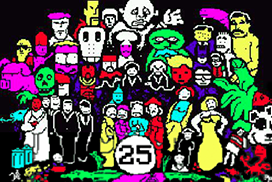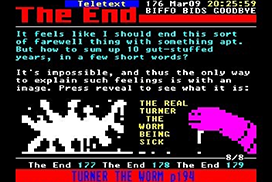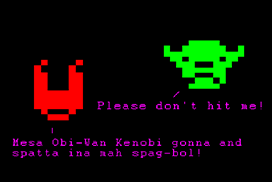
Grumble feature enabled

|
Burn, Hollwood, burn
Edge #151, July 2005
Since retiring from full-time games journalism I've forged something approaching a career as a TV scriptwriter. Doubtless you will now have formed a picture in your heads of the glamorous lifestyle I must therefore lead, perhaps involving me snorting cocaine off a mandrill's bottom while reclining in the back of a rocket car shaped like a top hat - well, such scenarios do indeed form much of my working life, but the remaining 25 per cent or so is mostly meetings.
It was at one such meeting recently that my former career intersected with my current one. A broadcaster was looking for a writer to help develop a project - which for anonymity's sake I shall call 'Junior Samurai' - that had begun life as a videogame. Somehow, I'd been recommended as experienced both in animation and samurai-themed television (not entirely true but hey, whatever).
From what I could gather, the developer behind the game had decided that 'Junior Samurai' (the concept could've been written up in two minutes on the back of a snotty tissue) was brilliant enough to work as some sort of multimedia brand. At some point it had been proposed to a broadcaster who had been sufficiently drunk to ask to see more.
I was invited to pitch for how I would help develop the existing show bible were I to be appointed lead writer. My enthusiasm hovered somewhere around tepid, but I was prepared to display willing. However, the minute I walked through the door I knew I hadn't got the job.
Before I'd even opened my mouth, it was clear that the representative of the broadcaster simply wasn't interested. Perhaps she didn't like my trousers, or maybe she thought the project itself was a lame duck, but for whatever reason the rude bint didn't look up from her mobile for the duration.
In the face of this distracting indignity I was left to outline my lacklustre vision for the show to the man from the games company. Sadly, although a polite enough fellow, he clearly didn't understand the first thing about writing for kids' TV. And to be honest, I probably blew what chance I had when I told him the existing series bible read like a videogame design document and the characters had all the emotional depth of end-of-level bosses.
By the meeting's end my disapprobation was extreme. Not just because of the indolent, text-frenzied hag behind the desk, but because someone with an entirely different set of skills and experience was to decide whether I could do a job I'd been performing for almost ten years. And I've got a BAFTA nomination! And a Sony Award for radio comedy! And - and - I'm the greatest guy in the world ever!
A few years back I interviewed the CEO of a well-established British developer. The firm had acquired a stable of international brands, which it hoped to develop into games. For reasons which can only be described as inexplicable, the company was also looking to turn several of these brands into big-budget movies. During our interview, the CEO made a real fuss about the major stars with whom they were already in negotiations and, without a hint of humility, revealed that he was even helping to write the screenplays himself.
As far as he was concerned his films were as good as in the can. But as our conversation progressed it became clear to me that here was someone - again, a perfectly pleasant chap - who was utterly out of his depth, splashing around in an industry he just didn't understand.
Yes, his firm was responsible for some mega-selling titles. Yes, he was a multi-millionaire with a pair of solid gold shoes. That didn't make him Steven Spielberg. Consequently, his films are probably no closer to getting made now, four years on, than they ever were.
I'd wager that about 40 per cent of the money I've earned from screenwriting is for projects that have never been made. Films, sitcoms, dramas, kids' shows - I've done the lot. One person I know even got the green light for an eight-part, primetime ITV series, only to see the entire thing fall apart two weeks before principle photography was due to begin.
As a writer you get used to it, through bitter experience. I knew that the aforementioned CEO's films wouldn't be getting made any time soon, same as I have my doubts that 'Junior Samurai' will ever make it to TV screens.
But these aren't the only incidents of developers trying to claw their way into Hollywood. It's like a successful optician deciding to branch out into hat repair, or something. Is it desperation over the state of a games industry continually on the verge of collapse? Is it embarrassment at working in an industry still perceived as targeted at oily, teenage boys? Or is it simply vanity?
The thing is, games aren't films any more than the games industry is the film industry. There are different rules and different strategies, and film and TV are well-oiled, well-honed machines. By comparison, the games industry is still creaking with growing pains.
Mr Biffo co-founded Digitiser, Channel 4's Teletext-based videogames section, and now writes mainly for television
Do you know of any important moments from the annals of Digi history that have been omitted? If so, then mail me (superpage58@gmail.com) right now, man. Credit will be duly given for anything that gets put up.









